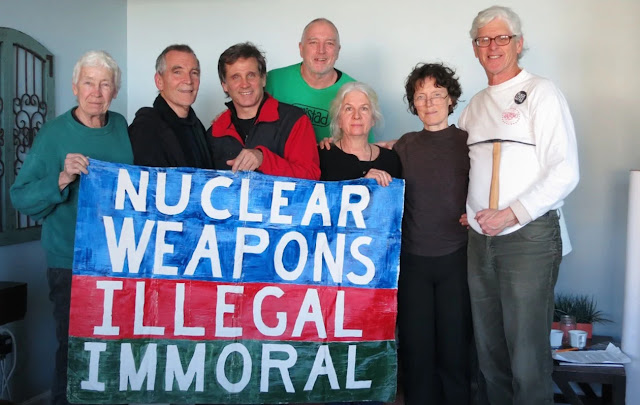Judge sentences 80-year-old Catholic activist for breaking into nuclear submarine base
(RNS) — A U.S. District Court judge has sentenced an 80-year-old Catholic peace activist to time already served for trespassing onto the Kings Bay Naval Submarine Base in St. Marys, Georgia, more than two years ago as part of a symbolic nuclear disarmament action.
Elizabeth McAlister, a former nun with the Religious of the Sacred Heart of Mary, had already served 17 months in a Glynn County Detention Center in Brunswick, Georgia, following the April 4, 2018 action.
In a video conference call on Monday (June 8), Judge Lisa Godbey Wood sentenced McAlister to time served, three years of probation and $25 a month in restitution until the amount of damage caused by the break-in — which the Navy estimated at $33,503 — is paid back in full by all the activists.
McAlister is part of a group of seven Catholic peace activists known as the Kings Bay Plowshares 7 who believe their faith compels them to oppose nuclear weapons to the point of committing acts of civil disobedience.
On the 50th anniversary of the assassination of the Rev. Martin Luther King Jr., the group cut a padlock at a maintenance gate at the Navy base that houses six Trident submarines carrying hundreds of nuclear weapons. They spilled blood on a Navy insignia affixed to a wall, spray painted anti-war slogans on the walkway and banged a nuclear arms statuary with hammers made from melted-down guns.
Activist ordered to pay restitution for naval base damage during protest
They were caught and arrested more than an hour into their action. The seven were charged with conspiracy, destruction of property, depredation of property and trespassing. After serving two months in jail, four members of the action were released on a $50,000 bond. McAlister and two others declined to accept the bail conditions and remained in jail.
“I have spent much of my adult life trying to speak out about the threat to all life on Earth that comes from our weapons of mass destruction and our national policies to continue to try to build more and more deadly and destructive weapons,” McAlister told the judge prior to the sentencing.
The seven were found guilty in October but sentencing was delayed. McAlister agreed to an online sentencing.
“You have spoken eloquently and your supporters have written equally eloquently about the firmness of your convictions, that is, your strongly held beliefs about which laws you believe are righteous and which you believe are not,” Judge Wood said Monday. “If you do choose to break those laws — and a jury of your peers finds that you’ve done so — there are consequences. That’s what brings us here —what is a just consequence."
The remaining six Plowshares activists are expected to be sentenced in person on June 29 and 30 in Brunswick, Georgia.
McAlister met and later married Philip Berrigan, a Catholic priest and peace activist who was prominent in Vietnam War protests in the 1960s. Berrigan and his brother, fellow priest Daniel Berrigan, came to national attention for burning draft records. But the two were equally committed to resisting nuclear arms.
In 1980, the Berrigan brothers broke into a General Electric weapons plant in King of Prussia, Pennsylvania. The Plowshares 8, as they were called, hammered on missile nose cones and spilled blood on some blueprints. They were found guilty and sentenced to prison. There have since been about 100 Plowshares actions.
In the early 1970s, Berrigan and McAlister founded Jonah House, in Baltimore, part of the Catholic Worker movement, a collection of about 200 independent houses across the country mostly run by lay people that feed and house the poor. The couple had three children. Berrigan died in 2002.
McAlister now lives with her daughter, Frida Berrigan, in New London, Connecticut.
In her five-minute statement, McAlister spoke about her biblical beliefs and said she will not apologize for them:
“I try to follow the instructions of the Prophet Isaiah about beating swords into plowshares and spears into pruning hooks,” McAlister said on the video call. “We should not learn more war anymore.”

